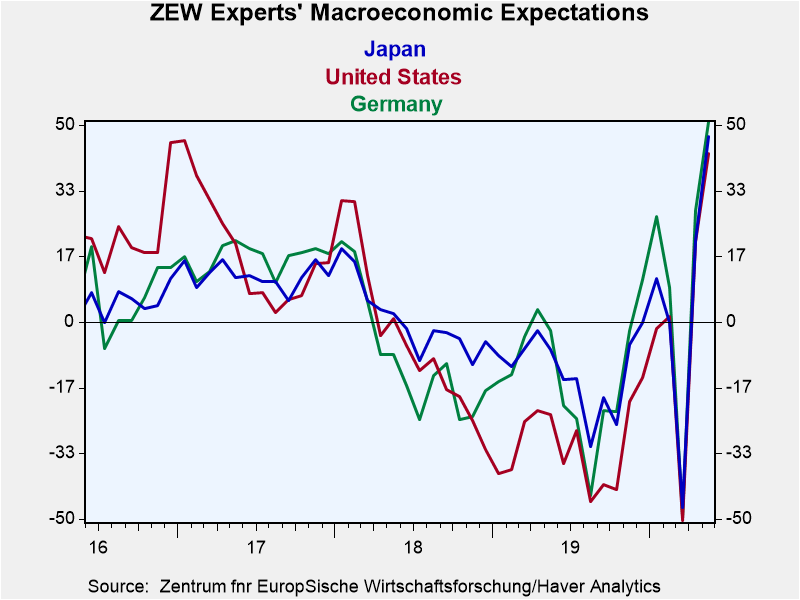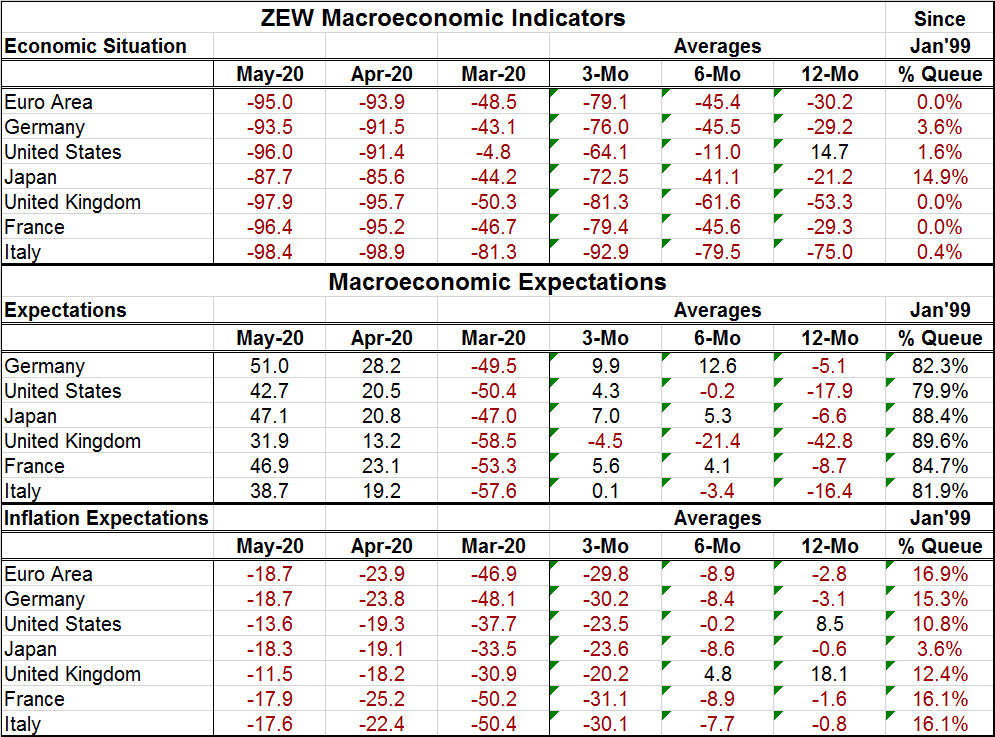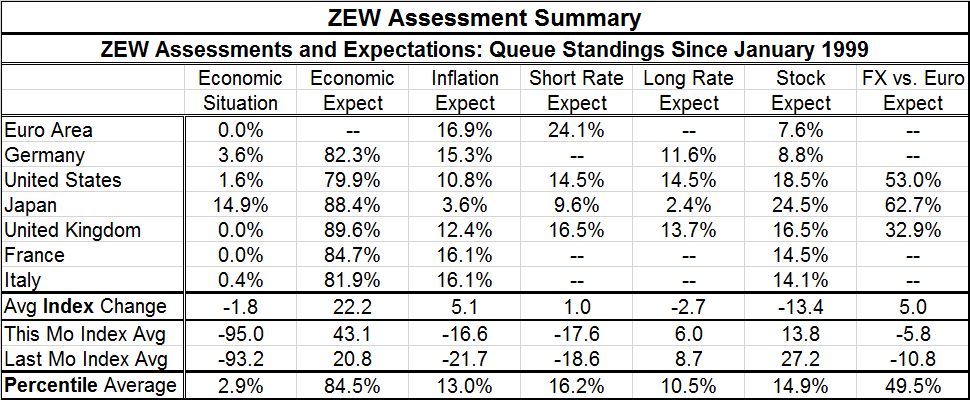 Global| May 19 2020
Global| May 19 2020ZEW Experts Try on Optimism…and the World View Is Bifurcated
Summary
Stock markets and ZEW experts have something in common but much less in common with the Dr. 'Faucis' and U.S. Democratic Party. ZEW experts see quite brightening expectations and stock markets have been recovering at a very rapid [...]
 Stock markets and ZEW experts have something in common but much less in common with the Dr. 'Faucis' and U.S. Democratic Party. ZEW experts see quite brightening expectations and stock markets have been recovering at a very rapid rate. Meanwhile, U.S. health experts caution about going slow, warning of second and recently third waves of infection. In the U.S. House of Representatives, Democrats want to extend stay-at-home excess unemployment payments through January 2021. The ZEW view and the U.S. Fauci-Democrat views are from different planets. These are very different views of the world's situation and prospects. Meanwhile, in the U.S., the President continues to exude optimism and to get trashed by the media for doing so. It's important to see here that Trump hardly stands alone nor can he be said to be the manipulator of ZEW experts' assessments nor of global stock market responses both of which tend to side with him.
Stock markets and ZEW experts have something in common but much less in common with the Dr. 'Faucis' and U.S. Democratic Party. ZEW experts see quite brightening expectations and stock markets have been recovering at a very rapid rate. Meanwhile, U.S. health experts caution about going slow, warning of second and recently third waves of infection. In the U.S. House of Representatives, Democrats want to extend stay-at-home excess unemployment payments through January 2021. The ZEW view and the U.S. Fauci-Democrat views are from different planets. These are very different views of the world's situation and prospects. Meanwhile, in the U.S., the President continues to exude optimism and to get trashed by the media for doing so. It's important to see here that Trump hardly stands alone nor can he be said to be the manipulator of ZEW experts' assessments nor of global stock market responses both of which tend to side with him.
There is a legitimate optimistic opinion out there.
Maybe it's time to look at the pessimists and subject them to further scrutiny over their ideology? Maybe the case for the never-ending lockdown is not that strong? Maybe the fears of what the virus can and will do are overblown? For example, NYC data show that people with underlying medical issues are dying 100 times more frequently than those who are healthy (who have no underlying medical conditions). That is a huge factor of difference. And we know the virus is killing more old people everywhere. Maybe the question should be not why we don't shelter longer but instead why we don't protect the vulnerable better. If we protect the vulnerable, we can have the best of all worlds: fewer deaths and stronger growth as well as economic and social freedom. But no one has put that plan on the table. Social distancing is for everyone…maybe that is what needs to change? Sweden, a country that is not doing forced lockdowns, is experiencing more deaths than other Nordic countries but fewer than other Western European nations but it also it has failed to protect the old as many of its deaths are concentrated in care homes. Why can't anyone seem to figure out where the real risk lies and protect the at-risk population? This failure is dumbfounding.
It seems we have a pretty good idea of what this virus is and who it preys on; we just do not have a policy to deal with that. Why not? And that is a global 'we.'
The ZEW details
The ZEW survey this month shows a slight worsening in the current economic situation in May compared to April. And based on the survey's construction, there is really little room for the current assessment signal to deteriorate much further (minus 100 is the worst reading possible). But expectations have been turning sharply higher in the past two months. The current erosion has slowed this month and expectations are finding traction. That does begin to look like a turning point is at hand.
Expectations are flying high in May, not simply 'improved a bit'. Here percentile standings are in the '80s' meaning that they have been historically higher less than 20% of the time and this is across the board. Only the U.S. has an expectations standing below its 80th percentile and the U.S. standing is at the 79.9 percentile.
Inflation expectations are up slightly on the month, but the raw score is still negative and the standings for the inflation outlook range from their 3.6 percentile to the 16.9 percentile -- all exceedingly weak standings. And along with that short-term interest rate expectations are slightly less weak this month.

It is quite curious how the ZEW expectations have changed over the past two months and how they square with the mainstream analysis we are getting in the U.S. Of course, Europe is something like a month ahead of the U.S. in terms of feeling the impact from the virus. Conditions on the ground there may be improving a bit more than in the U.S.

Living in the USA...
Something is going to have to give. Politically in the U.S. something will give. It is no coincidence that these views on what to do seem to cut along partisan lines. Trump wants to set the economy free and wants to ride a strong rebound into the November elections. It is the last thing Democrats want so they propose such high unemployment benefits through January that no recipient will want to go back to work. There is plenty of fearmongering over the prospect of second and third waves of infection and very little about dissecting the data to try to understand where the real risks lie and what polices might work best to restore growth sooner.
All the optimism in the U.S. is based on the prospects for finding a vaccine. And there are now several 'breakthroughs' to provide hope, but this is still tricky business. There is no guarantee that a vaccine will be found- in 12-months' time - or at all. For now the ZEW experts are at a turning point and they see ongoing improvement. That could change. They could be wrong. But it is a very different view from what has generally been offered up in the U.S. And unfortunately, we know that in the U.S. partisanship has divided everyone and split the press. We may still have a 'free press' and it may still be 'independent' but there is no question but that finding 'unbiased coverage' of anything with political overtones is getting harder and harder to do. And also almost everything has 'political overtones' these days. In this environment, the European view is much more important simply for what it is and what it says with no skin in the U.S. political game.
Robert Brusca
AuthorMore in Author Profile »Robert A. Brusca is Chief Economist of Fact and Opinion Economics, a consulting firm he founded in Manhattan. He has been an economist on Wall Street for over 25 years. He has visited central banking and large institutional clients in over 30 countries in his career as an economist. Mr. Brusca was a Divisional Research Chief at the Federal Reserve Bank of NY (Chief of the International Financial markets Division), a Fed Watcher at Irving Trust and Chief Economist at Nikko Securities International. He is widely quoted and appears in various media. Mr. Brusca holds an MA and Ph.D. in economics from Michigan State University and a BA in Economics from the University of Michigan. His research pursues his strong interests in non aligned policy economics as well as international economics. FAO Economics’ research targets investors to assist them in making better investment decisions in stocks, bonds and in a variety of international assets. The company does not manage money and has no conflicts in giving economic advice.






